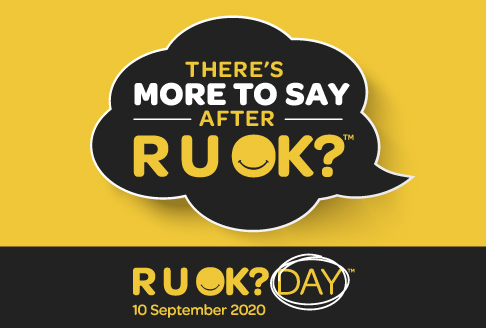R U Okay? Day – Start a conversation that could change a life
- 10 Sep 2020

We all experience life’s ups and downs, particularly during times like these. Such moments can really challenge us, and sadly many people feel they don’t have anyone to confide in. Today is R U OK? Day, when Australians are encouraged to invest more time in the people around them, to meaningfully connect and support one another. Asking that simple but important question “Are you OK?” could trigger a conversation that changes a life.
R U OK? Day is held on the second Thursday in September, as a national day of action dedicated to supporting those who may be struggling. This year’s message is ‘There’s more to say after R U OK?’
At Baptcare, our mission and vision are lived through our WE CARE values and Wellbeing plays a significant role in who we are, and what we do. Starting conversations with those who may not be quite themselves goes towards living our values, cultivating an encouraging and safe workplace, and strengthening connections with our customers, residents, volunteers, and anyone we come across in our daily lives.
Today, and every day, we encourage you to look for the signs that something’s not quite right with a friend, colleague, loved one, teammate, or neighbour – trust that gut instinct, reach out to them, and ask “Are you okay?”
The question is just the beginning. Have a conversation that could change a life by remembering these 4 simple steps (ALEC):
- Ask R U Okay?
- Listen
- Encourage
- Check in
Resources to assist you:
ruok.org.au/every-day-resources
You can find further information and tools at www.ruok.org.au.
Community news
-

Back to School Tips for Foster and Kinship Carers
Heading back to school can be exciting, but it can also bring up big feelings—especially for kids in care. Here are a few simple ways to help make the transition smoother.
- 17 Apr 2025
-

Easter Reflection from Emily Booth of our Spiritual Care Team
A few years ago, at Easter, I was staying with my sister and her family for the weekend. One afternoon we were all sitting around chatting and the kids were playing when my sister came into the room and placed a tray of fresh, warm hot cross buns on the table
- 16 Apr 2025
-

Student Volunteer Spotlight - Erin
Did you know that Baptcare has student volunteers at some of our Residential Aged Care communities? Our volunteers are an integral part of our Baptcare community, not only in residential aged care but across many of our programs and services. Volunteers provide essential connection, positivity and assistance to residents, clients and consumers.
- 04 Apr 2025
